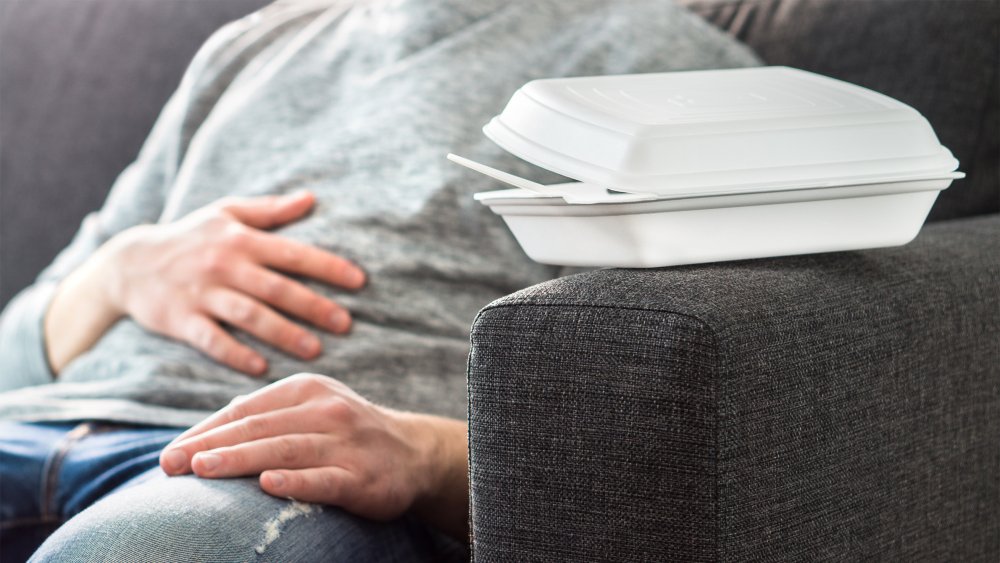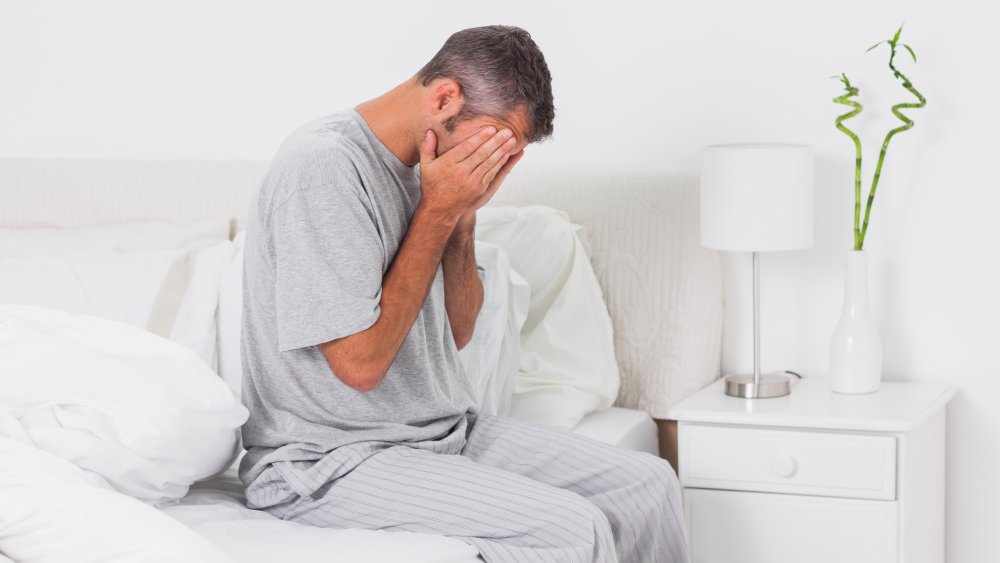If You're Bloated All The Time, This Is Probably Why
Jabba the Hut was bloated all the time because he was a giant slug-like alien. Violet in Willy Wonka & the Chocolate Factory ended up feeling bloated because she couldn't resist an experimental piece of bubblegum that caused her to blow up like a giant grape. But for the rest of us, the bloating we all experience from time to time doesn't always have such clear-cut triggers. It could be due to the foods we're eating, the volume of food we're eating, or even common medical conditions.
According to research conducted by the Johns Hopkins Bloomberg School of Public Health, an estimated 20 percent of the population experiences bloating in one form or another from time to time (via ScienceDaily). Healthline detailed the most common symptoms of bloating as stomach pain, overall discomfort, and gas. You may also feel the urge to burp or belch frequently or have abdominal rumbling or gurgling. But what's behind that feeling? Why are you feeling like you're about to explode — and what can you do about it to make the problem disappear? Read on to find out.
Chewing too much gum can leave you bloated
Just as Violet experienced with that mythical piece of blueberry-flavored bubble gum, chewing gum can leave a person feeling painfully bloated — albeit not as severe. There are actually a number of different triggers responsible for creating the sensation. Nutritional therapist Naomi Mead told Cosmopolitan that chewing gum can cause a person to accidentally swallow air while they chew. This trapped air in the gut can leave you feeling like a child's balloon — and can also be a major cause of painful bloating.
If you're watching what you eat, chances are you're also likely picking sugar-free gum over regular. Nutritionist Anne Mauney wrote in an article for the journal Food & Nutrition that sugar substitutes found in these gums can also be a very common cause of bloating. The issue comes from substances called sugar alcohols in the gum. While these substances taste sweet on the tongue — and make you feel like you're eating actual sugar — they're actually very hard for the body to digest. "Once in the intestinal tract, the sugar alcohol will meet bacteria that ferment it and release gas, which leads to bloating, cramps, pain and [possibly] diarrhea," she explained.
Bloating can be the result of slouching
Slouching in front of your computer can leave you feeling bloated. It's true! The finding comes from a bizarre study conducted at the University of Padova in Spain and published in the journal Gut. To study the effects of posture on gas levels within the body, researchers actually intubated eight healthy volunteers and infused a "a gas mixture" into the tubes. They performed the test on each individual not once but twice — once while they were standing and once while they were reclined.
As you might expect at this point, the individuals tolerated the gas much better — and experienced significantly less bloating — when they were standing up straight compared to when they were reclining. And the finding doesn't appear to be a fluke. In research cited by Harvard, poor posture has also been linked with a number of other digestive ills, ranging from slowed digestion to heartburn to constipation — all of which result in bloating. How's that for a reason to stand up straight?
The way you eat may lead to bloating
If you chew with your mouth open, eat super quickly, or talk exceptionally fast — and you regularly suffer from bloating — you may have a condition called aerophagia. But don't worry! It's nothing life-threatening. Rather, it simply means you're a person who tends to swallow a lot of air. And that swallowed air can leave you feeling bloated.
WebMD described aerophagia as a disorder that occurs when you swallow enough to make you burp frequently or to upset your stomach and leave it feeling bloated or uncomfortable. An estimated 25 percent of the population will experience the condition at some point in their lives. Symptoms of aerophagia include stomach pain, a swollen midsection, and frequent belching — sometimes several times within a single minute.
People who have anxiety or depression are especially at risk. However, antacids can help if the condition is caused by acid reflux. Changing the way you eat and making an effort to eat slower are behavioral modifications that help the problem to go away.
Eating too much at meal times can leave you feeling bloated
You don't need to down a Thanksgiving feast in order to feel like a hot air balloon. Even less excessive overeating can lead to feeling bloated. It makes sense. For starters, the sheer volume of the food consumed can expand your stomach and weigh you down, making you feel bloated. Eating food too quickly can also overwhelm your digestive system, making it sluggish and causing the gas that's produced while eating to painfully expand your stomach and intestines. But the connection between overeating and bloating doesn't stop there.
If you're eating foods you don't normally eat, that can also promote bloating, Laura Manning, a nutritionist at Mount Sinai Hospital explained to Self. If you're eating foods with more fat or salt then you're used to tolerating, she said, "those are two huge factors that can contribute to bloating." The best ways to eliminate that bloated feeling in a hurry? According to Self, go on a brisk walk to help stimulate your digestive system or brew some mint tea, which can help to relax your digestive system.
Your bloated feeling might be the result of stress
Whether you're feeling anxious and stressed over everyday problems or more personal issues, one thing is abundantly clear: Stress can have a huge impact on the health of your body. And its negative effects can hit you just about everywhere: your brain, your heart, and even your digestive system. The American Psychological Association (APA) reported that stress can have a serious impact on the connection between our brains and the hundreds of millions of neurons that control the cells throughout the digestive system. Effects of stress in this area can trigger pain, bloating, and other gut discomfort.
"Stress is associated with changes in gut bacteria which in turn can influence mood," the association explained. "Thus, the gut's nerves and bacteria strongly influence the brain and vice versa." The stomach is especially prone to the effects of stress, the APA cautioned. Excessive stress can promote vomiting, loss of appetite, and can even make the stomach more sensitive to a variety of sensations, ranging from pain and nausea to bloating — making these feelings all feel stronger and more severe.
Downing too many salty foods can leave you feeling seriously bloated
It starts out innocently enough. You sit down in front of the TV with a bag of your favorite chips. Or maybe it's a big bowl of popcorn. Either way, before you know it, the whole thing is gone. The inevitable bloat that rushes over you afterwards isn't just the result of pigging out, though. It's also a sure sign you've taken in too much salt.
According to a study conducted at Johns Hopkins University Bloomberg School of Public Health, a high-sodium diet can increase a person's risk for feeling bloated by 27 percent (via ScienceDaily). The exact mechanism behind the finding is still being studied, as of this writing.
Scientists already know that salt increases fluid retention, which may be partially to blame for the bloating sensation. However, the study's author, epidemiologist Noel Mueller, also hypothesized that a large intake of salt may alter levels of microbes in the stomach, increasing production of other compounds that can leave a person feeling bloated.
Your unwanted bloat could be the result of travelling
Whether you're fresh off a long flight or you've logged several days behind the wheel on an epic road trip, it's incredibly common to feel bloated when you travel. New foods and new environments can do that to even the most seasoned traveller. While less-than-healthy snacks during your travels are likely partly to blame, there are some other surefire bloat producers at play — and they have nothing to do with pressurized cabins or changes in altitude.
According to Lisa Ganjhu, a gastroenterologist at NYU Langone Medical Center, sitting for long periods without moving is a cause of bloating for most people, whether you're traveling by plane or in a car. You're just not moving around enough, she explained to Self. Getting up and walking around every couple hours can alleviate the problem, she said, and will also allow you to get your blood flowing and pass some gas that might otherwise contribute to sensations of bloating.
Staying well-hydrated and sipping water regularly while traveling — especially on an airplane — is advisable as well. "The lack of humidity in cabin air can quickly pull fluid from the body," Emily Cope-Kyle, registered dietitian nutritionist, told Self.
Bloated feelings can be caused by specific foods you eat
It's no surprise that beans can leave you feeling gassy, but according to experts at Harvard, there's a whole other group of foods out there that can also leave you bloated. The foods in question all fall into a group nutritionists have tagged with the unwieldy acronym FODMAPs, which stands for fermentable oligosaccharides, disaccharides, monosaccharides, and polyols.
All you really need to know is that foods that fall within this group — including foods with artificial sweeteners, milk, wheats, rye, garlic, onions, chickpeas, lentils, pistachios, cashews, asparagus, artichokes, and honey — all contain unique sugars that the body can have a hard time digesting.
"We all have an increased amount of gas in the body after eating them, but some of us react to them more severely than others," explained Kyle Staller, a gastroenterologist at Massachusetts General Hospital. When Dr. Staller suspects certain foods within a person's diet may be making them feel bloated, he generally puts the patient on a very basic diet, free of most FODMAPs. Foods are then gradually added back into the person's diet until the offending bloat-producing culprit is identified.
Bloating may be a side effect of a medication you're taking
"When a patient walks into my office complaining of bloating, the first place I look is their medicine cabinet," wrote Robynne Chutkan, an integrative gastroenterologist, wrote on her site. One of the biggest offenders when it comes to prescription medication-induced bloat are antibiotics, she explained. These drugs can inadvertently kill many of the good bacteria in your stomach that help to maintain proper gut health. In their absence, microbes and fungi that promote gas can take off, leading to unpleasant bloating. Taking probiotics with an antibiotic can help to keep the problem in check, Chutkan advised.
Additionally, NSAIDs, like aspirin, can damage the lining of stomach and intestines and cause the body to retain fluids. which may lead to the sensation of bloating. Estrogen-based birth control may also lead to bloating as they can cause fluid and salt retention. Finally, Dr. Chutkan recommended looking out for steroids, which can cause imbalances in the digestive system as well as cold medicines containing codeine as they can slow the movement of food through your GI tract, leading to — you guessed it — bloating.
Your bloating could be due to a medical condition
"From stomach problems to colon problems, anything that interferes with the normal digestion of food can lead to excess gas in the system," cautioned Everyday Health. Conditions like gastritis, lactose intolerance, Celiac disease, and irritable bowel syndrome are among the most common medical causes of painful bloating.
Gastritis is typically caused by swelling or irritation of the stomach due to ulcers, medications, or overproduction of stomach acid whereas lactose intolerance is a result of the body being unable to digest a natural sugar called lactose found in dairy products. Similarly, Celiac disease is also categorized by an intolerance, not to dairy but to gluten. This can be found in foods made from wheat. The science isn't clear on what causes irritable bowel syndrome, but it may occur when muscles in the digestive system move in an unusual or unexpected way.
Unfortunately, all of these conditions have one thing in common: bloating. If suspect any of these conditions or if your bloating is accompanied with other serious issues like unexplained pain, vomiting, heartburn, bleeding, cramps, or unusual or unexpected weight loss, you should schedule an appointment with your doctor.
Bloating can be a warning sign of ovarian cancer
A swollen or bloated abdomen, persistent abdominal pain, and feeling constantly full are all potential warning signs of ovarian cancer, according to The Clearity Foundation. Since the symptoms are common and can be attributed to a number of other conditions, the foundation revealed that only a small number of women are diagnosed early. "The rest find out about their disease after it has spread outside the ovaries or fallopian tubes," per the site. This makes it much more difficult to treat and eradicate.
To make sure you aren't ignoring possible symptoms, Cure Our Ovarian Cancer charity recommends seeing a doctor if you experience severe bloating, painful or burning bowel movements, the sensation of an abdominal mass, or other unusual symptoms for longer than two weeks.
Women should be on the lookout for persistent symptoms that don't go away, warns the National Ovarian Cancer Coalition. "Because these signs and symptoms of ovarian cancer have been described as vague or silent, only approximately 15 percent of ovarian cancer is diagnosed in the early stages."
Being pregnant can leave you feeling bloated
We all know that things like a missed period and nausea can point to pregnancy, but according to What to Expect, bloating is another common and very typical sign of a new pregnancy and impending baby bump.
"You can blame [the bloat] on the hormone progesterone, which helps slow down digestion, giving the nutrients from foods you eat more time to enter your bloodstream and reach your baby," the site explained. "While progesterone is essential for maintaining a healthy pregnancy, it also triggers that oh-so-delightful trio: bloating, burping and passing gas," another What to Expect article revealed.
The reason for this bizarre occurrence? Progesterone relaxes muscle in your stomach and intestines, slowing digestion. This gives your body more time to absorb nutrients from the food you eat — but also increases pressure throughout your digestive system leaving you feeling seriously uncomfortable and bloated. For many pregnant women, bloating usually starts to show up at around 11 weeks into a pregnancy and can unfortunately continue all the way up to the time of delivery.
Chronic drinking can leave you chronically bloated
You can get more than a hangover and a beer belly from overindulging on beer and alcohol. "Drinking too much on a single occasion or over time can take a serious toll on one's health," Gail Basch, director of the Rush Addiction Medicine Program at Rush University Medical Center, warned in an interview with the Chicago Tribune.
In addition to being packed with calories that can make you gain weight, heavy drinking can impact your body's ability to burn fat. Excessive alcohol can also be an irritant to the digestive system, triggering nausea, cramping, and diarrhea — all of which can also leave you feeling bloated and miserable.
The Tribune further highlighted that chronic drinking can lead to nutritional deficiencies, and such deficiencies cause your ab muscles to lose strength, your stomach to stick out, and can greatly increase your risk for cirrhosis of the liver — a condition that can cause fluids in the abdomen to build up to the point where they impair breathing and may need to be drained, again creating an incredible bloated sensation for those who are impacted.
Your sex life could be leaving you feeling bloated
Sex can leave you feeling blissful, contented, and ... bloated? It's true, according to women's health expert and physician Jennifer Wider. While the sensation of feeling bloated isn't what you might expect after sex, its not uncommon, Wider told PopSugar. One cause of this bloating is a retroverted uterus, she said. When the uterus is retroverted, it tilts back towards other organs in the body. Sex can cause the uterus to painfully move against these other organs. Since that may be the only symptom of the condition women experience, the only way to know if your uterus is affected is to get a medical exam.
Wider cautioned that unprotected sex can also trigger bloat due to compounds called prostaglandins, which are found in semen. They can cause the uterus to contract, triggering a sensation of bloating. Lastly, bloating after sex can also be a byproduct of a woman's menstrual cycle, the expert explained. Since hormones can cause numerous changes within the body, especially during one's period, it wouldn't be unusual for you to experience bloating as a result, she said.















